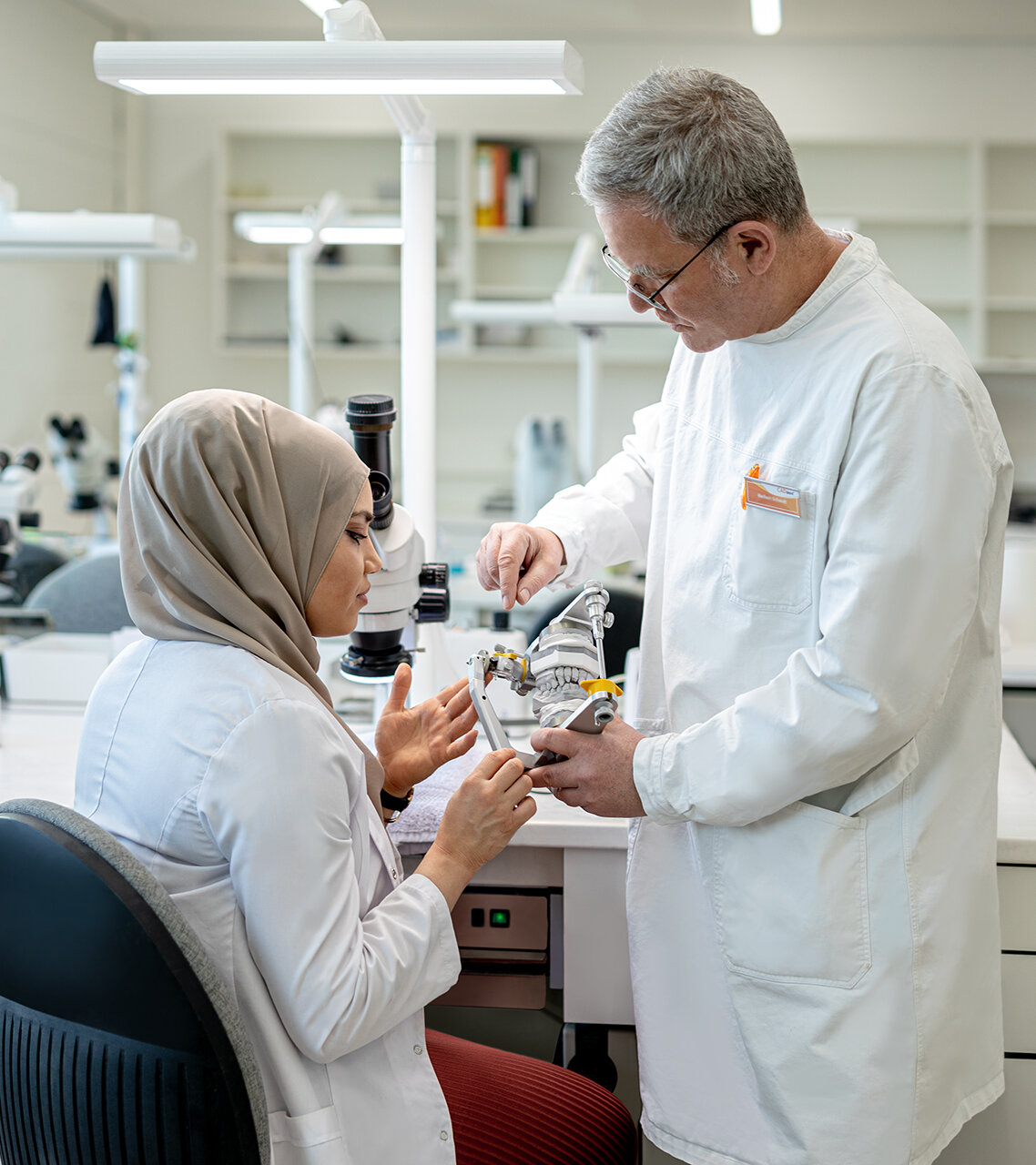That's how important the professional profile of
a dental technician is
- yesterday, today and far into the future
Are you also taking part in the so-called “war for talent”? That starts with the trainees. But why do young people not have the dental technician job on their radar, despite its versatility? The influence of the parents certainly plays a role that should not be underestimated.
During our last visit to the job fair “fit for job!” in Augsburg, our personnel officer was confronted with a thesis by an interested mother, which you have probably often thought about yourself:
"Dental technician is an interesting profession in itself, but with the advent of digitization, this work is being taken over by machines. Specialists in this area are therefore superfluous.“
We would like to clear up this thesis today, because dental technicians will under no circumstances be replaced and certainly not become superfluous.
Yes, a lot of work that used to be done by hand by dental technicians is now done by machines. The best example is the polishing of partial framework (RPD) with a polishing machine. But does that affect the future viability of the dental technician profession? Our answer to that is as clear as seldom: "No!“
The job description of a dental technician will continue to change. If you look back at the long history of this profession, there has never been a standstill here.
Let's take a closer look at the history of the dental technician profession
Even if the term "dental technician" has only existed in this form since 1911, the practice of the techniques is much older.
4,500 years - that's how far back the history of dentures goes, back then still made of bone or ivory. The cornerstone for aesthetic dentures was laid in 1710 with artificial teeth made of porcelain - the forerunner of today's zirconia. Dental technology received another boost in 1728 with the first dental specialist book (Pierre Fauchard). Process techniques such as wax impressions become the standard, which was supplemented by techniques such as telescopic crowns and hollow casting at the end of the 19th century.
Since then, the development of dental technology has progressed rapidly - in 1930 dental technology was recognized as a separate craft in Germany and in 1936 the first master craftsman was released in southern Germany. In 1965, the first training regulation for dental technicians came into force, the content of which is constantly being revised and adapted to technical, dental and prosthetic developments.
(Success) Criteria for changing the professional profile of a dental technician
In retrospect, it can be said that the job profile of a dental technician has always changed. The basis for change is the most recent scientific knowledge, but also access to new materials and innovative technologies.
What cannot be replaced by any technology or new material is the know-how and experience of dental technicians. Some - sometimes unpleasant - work is made easier for us or even completely taken care of by machines. But who tells the machine what to do and how the dentures create a feel-good experience for the patient in terms of form and function? Only a dental technician can do that.
It is uncertain how the job profile will develop and change in the future, but it is undisputed that digitization, social responsibility and health awareness are drivers of development.
Aesthetics will continue to play a major role in dentures and tooth preservation, and with it creativity in terms of shape and color. As in the past, technical understanding will be one of the prerequisites for learning this profession, because in the body ecosystem, a holistic view of health and well-being is not just about aesthetics, but also about the functionality of dentures.
Job profile dental technician as a stepping stone
The profession as a decision for a whole life has long since been overtaken and there are many development opportunities once you have learned and mastered the basics of dental technology. The industry field is large and everything is conceivable, from materials science and the development of new technologies to the master’s examination and further education that follows the training or a university degree in dentistry.
With us, dental technicians have the opportunity to live out their creativity in our partner laboratory “Labor Rager” in conventional technology, to design dentures virtually in form and function using CAD systems, to accompany the implementation on the basis of CAM technologies, to optimize manufacturing processes with innovative ideas or to work on projects, who, for example, have the testing of new materials or techniques as their subject, to collaborate or even lead them. Anyone who loves dealing with people and likes to pass on knowledge, know-how and experience also has the option of proving themselves in positions in customer service, technical customer support or sales.
OUR CONCLUSION
The dental technician profession will continue to offer plenty of scope for development in the future and will continue to develop with progressive knowledge based on science, digitization and the latest trends. Anyone who is open to change will be able to use these developments for themselves and for the benefit of patients.
